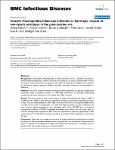Invasive Haemophilus influenzae infections in Germany: impact of non-type b serotypes in the post-vaccine era
Kalies, Helen
Siedler, Anette
Gröndahl, Britta
Grote, Veit
Milde-Busch, Astrid
Kries, Rüdiger von
Background: Haemophilus influenzae type b (Hib) vaccination led to a significant decrease in invasive bacterial infections in children. The aim of this study was to assess a potential shift to more non-type b invasive infections in a population with high Hib vaccination coverage and to compare the burden of suffering between children with Hib, capsulated non-b and non-capsulated Hi infections. Methods: Cases with confirmed invasive Hi infections were ascertained through two independent nationwide active surveillance systems in 1998–2005. Information on possible predisposing conditions and clinical information was available from 2001 onwards. Results: The total number of reported non-type b Hi cases varied between 10 cases in 1998, 27 in 2000 and 14 in 2005. In each year, non-capsulated serotypes outnumbered capsulated non-type b ones. 192 cases were detected in 2001–2005, more than one half was non-type b and 88% of the non-type b cases were non-capsulated. For cases with Hib/capsulated non-type b infections the most common clinical presentation was meningitis (67% each); 89%/78% had no potential predisposing condition, 75%/72% completely recovered from disease and 6% (each) died. In contrast, meningitis was diagnosed in 34% of the non-capsulated Hi infections, septicaemia in 28% and pneumonia 21%; 62% had no potential predisposing condition, 83% completely recovered and 3% died. Conclusion: There was no increase in non-type b Hi invasive infections during 8 years of active surveillance in Germany. Invasive disease due to non-type b Hi is not confined to children with risk factors. In patients with capsulated non-type b Hi infections the proportion of meningitis cases is similar to Hib, but double as high as in non-capsulated Hi.
No license information
Related Items
Show related Items with similar Title, Author, Creator or Subject.
-
2014-07-09ZeitschriftenartikelBeta-Lactam Antibiotics Stimulate Biofilm Formation in Non-Typeable Haemophilus influenzae by Up-Regulating Carbohydrate Metabolism Wu, Siva; Li, Xiaojin; Gunawardana, Manjula; Maguire, Kathleen; Guerrero-Given, Debbie; Schaudinn, Christoph; Wang, Charles; Baum, Marc M.; Webster, PaulNon-typeable Haemophilus influenzae (NTHi) is a common acute otitis media pathogen, with an incidence that is increased by previous antibiotic treatment. NTHi is also an emerging causative agent of other chronic infections ...
-
2009-09-17ZeitschriftenartikelDurchführung von Surveillanceprogrammen zur Überprüfung der Wirksamkeit von Impfprogrammen am Beispiel von Haemophilus influenzae Typ b und Varizellen Kalies, Helen; Siedler, AnetteUm die Wirksamkeit eines Impfprogrammes einschätzen zu können, ist nicht nur Wissen über die Wirksamkeit eines Impfstoffes in der Anwendungsrealität wichtig, sondern – neben vielen weiteren Aspekten – auch über die ...
-
2020-07-21ZeitschriftenartikelWissenschaftliche Begründung für die Empfehlung zur Grundimmunisierung gegen Diphtherie, Tetanus, Pertussis, Poliomyelitis, Haemophilus influenzae Typ b und Hepatitis B mit dem 6-fach-Impfstoff im Säuglingsalter nach dem 2+1-Impfschema STIKOSeit 1994 wurde für die Sechsfachimpfung bei Säuglingen ein 3+1-Impfschema empfohlen. Nach der neuen STIKO-Empfehlung im Epidemiologischen Bulletin 26/2020 sollen Säuglinge die Sechsfachimpfung zukünftig nach dem 2+1-Schema ...

